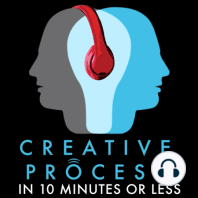
Are we living in a Simulated Universe? - MELVIN VOPSON
Are we living in a Simulated Universe? - MELVIN VOPSON
ratings:
Length:
9 minutes
Released:
Dec 27, 2023
Format:
Podcast episode
Description
"These ideas go as far back as Ancient Greece, which basically gave birth to two lines of thinking, two ideologies, materialism and idealism. And the idealist thinkers like Plato regarded reality as a projection of our minds, as something that is not real. And the only thing that is real is our consciousness and our minds and everything else around us is just constructs of our proception and projections. And that was a philosophy that was opposed to materialism, which regards the world as in a materialistic way, made up of atoms and matter and our minds are a product of these chemical reactions and the matter is coming together and forming our minds and consciousness. And everything in the world exists regardless of our consciousness or our minds and the universe is there and it's a materialistic view of the world. So these are two competing ideologies, and this is actually how we see the world today in a materialistic way.What the simulated universe philosophical idea belongs to is this idealistic view of the world. And the idealism philosophy morphs into something else in this simulation hypothesis where not only everything is a simulated construct, but our minds and our consciousness are part of it.So for example, Plato saw our minds and, if you want, our spirit as a fundamental central piece and the only real thing, and everything emerged from this. The simulated hypothesis assumes that everything, including our minds and consciousness, is part of a simulation. So it's a bit of a modern iteration of idealism which has been triggered by these recent developments in advancing technologies and computing science that began in the 1940s with the development of silicon technologies, early microchips, and digital computers creating digital memories.This highly accelerated rate of development, in terms of our technological progress, in less than a hundred years going from analog technologies means we are entering a new era of quantum computers, like generative AI, and artificial intelligence, and all these VRs are a reality today. So this development has helped in some ways to lead to the emergence of this simulated universe concept because we are now reaching a new technological level where we see that we are beginning to simulate virtual realities and they are becoming more and more immersive and sophisticated."Dr. Melvin M. Vopson is Associate Professor of Physics at the University of Portsmouth, Fellow of the Higher Education Academy, Chartered Physicist and Fellow of the Institute of Physics. He is the co-founder and CEO of the Information Physics Institute, editor-in-chief of the IPI Letters and Emerging Minds Journal for Student Research. He is the author of Reality Reloaded: The Scientific Case for a Simulated Universe. Dr. Vopson has a wide-ranging scientific expertise in experimental, applied and theoretical physics that is internationally recognized. He has published over 100 research articles, achieving over 2500 citations.https://www.port.ac.uk/about-us/structure-and-governance/our-people/our-staff/melvin-vopsonhttps://ipipublishing.org/index.php/ipil/RRwww.creativeprocess.info www.oneplanetpodcast.orgIG www.instagram.com/creativeprocesspodcast
Released:
Dec 27, 2023
Format:
Podcast episode
Titles in the series (100)
JEAN WEINER: Interviewed by Mia Funk & Phoebe Brous · Associate Podcast Producer Phoebe Brous by The Creative Process in 10 minutes or less · Arts, Culture & Society: Books, Film, Music, TV, Art, Writing, Creativity, Education, Environment, Theatre, Dance, LGBTQ, Climate Change, Sustainability, Social Justice, Spirituality, Feminism, Technology 20 min listen